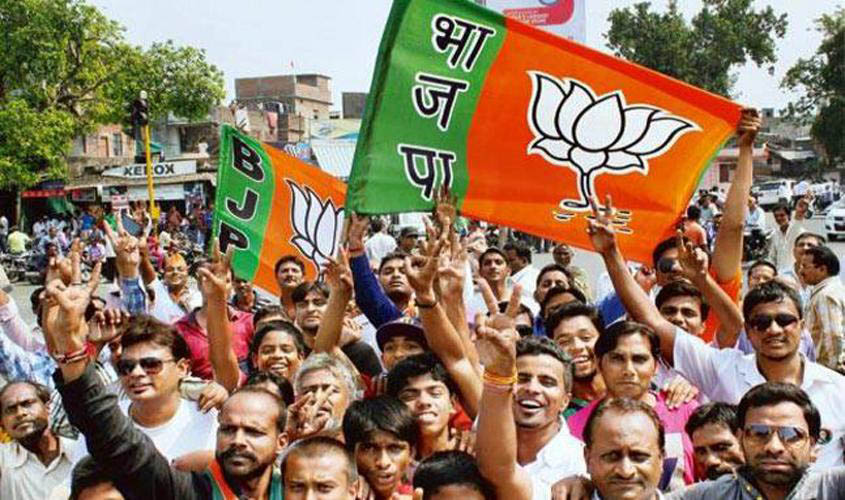The impressive victory of the Bharatiya Janata Party in the Delhi Municipal Corporation polls has demonstrated once again that Prime Minister Narendra Modi’s charisma reigns supreme and he continues to be the most successful vote catcher in the country. However, the saffron brigade’s over reliance on its most potent weapon for a civic poll exposes chinks in the organisational set up of the BJP in the national capital. Delhi has always been the nucleus of the Bharatiya Jana Sangh and subsequently the BJP. It has produced outstanding leaders, who had in the past withstood the onslaughts from a dominant Congress, thereby holding their own ground to ensure that the Hindutva flame burnt as bright as it could.
It goes without saying that Modi is a national leader and he is going to be the pivot of the BJP campaign in the 2019 Parliamentary polls and will spearhead the Assembly elections in Himachal Pradesh and Gujarat later this year. The problem that is likely to arise as is evident from the recently concluded Delhi polls is that the BJP needs to allow local and state level activists to evolve as leaders in the overall interests of the organisation and its future.
Despite its dismal performance in the civic bodies in the last ten years, the BJP triumphed and in the process gave a big drubbing to its rivals, the Aam Aadmi Party and the Congress. The outcome being that the new corporators have no experience, which effectively means that there will be high dependency on the bureaucracy for them to deliver. The majority of them also realise that the old dictum “first deserve than desire” does not apply to them, since their podium finish is on account of Modi, rather than their own abilities.
The issue that arises is that unless the BJP in the city learns to stand on its own feet, it will in the future face major and myriad problems. Delhi is the place where many of the Bharatiya Jana Sangh/BJP presidents commenced their political careers. Both Atal Behari Vajpayee and L.K. Advani have represented the capital in the Lok Sabha. Prior to them the late Balraj Madhok, co-founder of the Jana Sangh as also Prof Manohar Lal Sondhi and Kanwar Lal Gupta were successful in key Parliamentary elections.
The Punjabi troika of Vijay Kumar Malhotra, Kedar Nath Sahani and Madan Lal Khurana dominated the politics here for several decades. In fact, Vijay Kumar Malhotra was the first Jana Sangh leader to be sworn in as the Chief Executive Councillor (equivalent to Chief Minister) in 1967 and served a full five-year term. Interestingly, during this period, Advani was the Chairman of the Delhi Metropolitan Council. Such was Malhotra’s popularity that in order to defeat him from Patel Nagar, the Jana Sangh stronghold at the time, in 1972, former Prime Minister Indira Gandhi went door to door to campaign for his rival, Savita Behn, mother-in-law of cine star and producer director Manoj Kumar. Malhotra and Khurana were able to withstand the Indira onslaught and were among the five Jana Sangh leaders, who made it to the Metropolitan Council.
Besides Malhotra, former Deputy Mayor Balraj Khanna was a Jana Sangh pillar from Patel Nagar—whose death after falling from the roof of the Motherland office in Jhandewalan remains a baffling mystery. Lala Hansraj Gupta, former Mayor was also a stalwart of the party in the city and so was Master Prithvi Nath, father of Harish Sharma, better known as the late Pramod Mahajan’s closest aide.
Khurana took over from where Malhotra left and was, after H.K.L. Bhagat of the Congress, the most sought after and accessible leader in Delhi, who won 10 out of the 11 elections he contested. Just as Advani built the BJP at the national level, it was Khurana who was its architect in Delhi. In fact after Khurana was eased out from local politics, the BJP has been unable to produce a leader of his stature. This is acknowledged by one and all.
Union Ministers Harsh Vardhan and Vijay Goel have tremendous good will, but perhaps needed an adequate platform to become as influential and effective as the leaders of the past. In 2015, the BJP experiment of projecting Kiran Bedi as its Chief Ministerial face, misfired. Bedi lost from the Krishna Nagar seat, raising doubts over the strategy adopted by the party. Keeping the changing demographics in mind, the Central leadership has given Manoj Tewari, the local MP and Bhojpuri actor, the opportunity to expand the party base. Tewari is comparatively new to the local political scene and may take some time to evolve as a leader. At least three other party MPs are also not conversant with the dynamics and owe their victory in the Lok Sabha entirely to Modi.
Currently a whole crop of corporators, the basic level from where electoral politics begins, are novices, who are expected to deliver, since people have high hopes from the Prime Minister. There is nobody in the Delhi BJP whose hand they can hold to achieve their goal. Thus the BJP has both a weak second and third line of leadership. The Prime Minister is its sole mascot. Between us.

